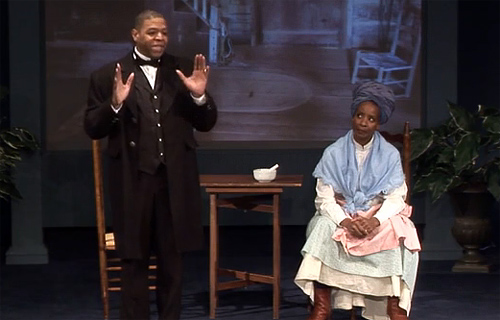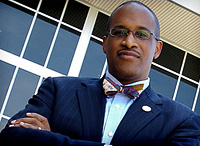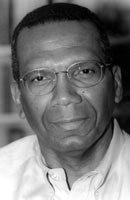Black History Month at DePauw
February 17, 2011

A bit of living-history opened a series of events recognizing Black History Month at DePauw.
Billing itself as a “living history museum without walls,” Indianapolis-based Freetown Village performed Mixed Medicine, a play that explores the historical issues surrounding healthcare in the African-American community.
Leila N. Patterson ’11, president of DePauw’s Association of African-American Students (AAAS), who sponsored the performance, says AAAS chose the play because it deals with issues that are not only relevant to black history, but also to current national and campus discourse.
“We like to have events during Black History Month that speak to our community, especially ones that connect to students right now,” Patterson says.
 On Friday, Feb. 25, Philander Smith College President
Walter M. Kimbrough will speak about the important connection between African
Americans and Greek campus organizations. AAAS is among a number of co-sponsors
for Kimbrough’s lecture, including DePauw members of the National Pan-Hellenic
Council, which represents nine historically black Greek fraternities and
sororities. The free talk is scheduled at 6 p.m. in the Peeler Center
auditorium.
On Friday, Feb. 25, Philander Smith College President
Walter M. Kimbrough will speak about the important connection between African
Americans and Greek campus organizations. AAAS is among a number of co-sponsors
for Kimbrough’s lecture, including DePauw members of the National Pan-Hellenic
Council, which represents nine historically black Greek fraternities and
sororities. The free talk is scheduled at 6 p.m. in the Peeler Center
auditorium.
Black History Month’s origins can be traced back nearly a century to 1926, when historian Carter G. Woodson founded Negro History Week. At a time when former slaves were still alive and segregation was law, the week was meant to educate all people about the significant contributions to American history by African Americans. Fifty years later, in 1976, February was designated as Black History Month nationally.
“Black History Month represents the progression of trials and tribulations of African Americans in this country,” Patterson says, “and it also acknowledges the great things that have happened in our history. That’s why I appreciate this month so much; it’s about challenging people and educating them at the same time – intellectual engagement at its best.”
Clarissa L. Peterson, associate professor of political science and director of DePauw’s Black Studies Program, says that Black History Month continues to be as important and relevant as ever because it fills a hole in American history education.
“Until children can go to school and learn more about black people than ‘they were slaves, Harriet Tubman and Martin Luther King Jr.,’ we will still need Black History Month,” she says.
 On Monday, Feb. 28, Black Studies and Classical Studies
are co-sponsoring a Black History Month lecture by Kenneth W. Goings, a
professor of history at The Ohio State University. His lecture will deal with the role of Africans in the
classical literature and history, as taught in American colleges. It is
scheduled at 7 p.m. in the Union Building ballroom, and it is free and open to
the public.
On Monday, Feb. 28, Black Studies and Classical Studies
are co-sponsoring a Black History Month lecture by Kenneth W. Goings, a
professor of history at The Ohio State University. His lecture will deal with the role of Africans in the
classical literature and history, as taught in American colleges. It is
scheduled at 7 p.m. in the Union Building ballroom, and it is free and open to
the public.
Goings has written several books about African-American history, including The NAACP Comes of Age: The Defeat of Judge John J. Parker and Mammy and Uncle Mose: Black Collectibles and American Stereotyping, each of which won an Outstanding Book Award from the Gustavus Myers Center for the Study of Human Rights.
As with AAAS, for which Peterson serves as faculty sponsor, the Black Studies Program tries to plan events that reinforce the University’s mission.
“We tend to look at what’s going on in the world, what’s going on in the academy, and look at ways in which we can enhance our students and the University,” she says. “We’re looking for timely topics that enrich the liberal arts experience.”
